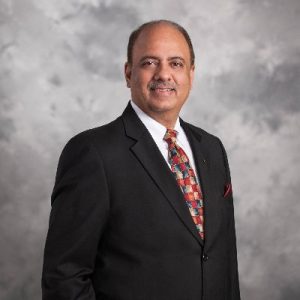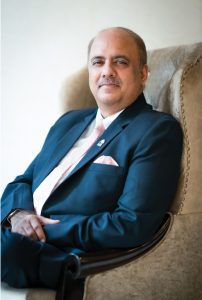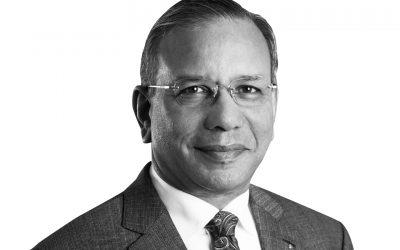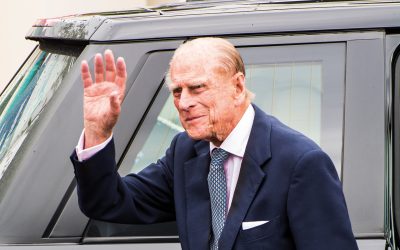Shekhar Mehta takes over as President of Rotary International in July.
He joined Rotary aged just 25 and soon adopted the motto that if somebody asked – he would say yes.
Now living in Kolkata and a member of the Rotary Club of Calcutta Mahanagar, Shekhar said: “Dreams have to be big enough for people to be motivated to achieve them.
“Gandhi once said that if you find the goal, the means will come. That’s how it’s been my whole Rotary life.”
With a theme of ‘Serve to Change Lives’, this is an extract of an interview first published in Rotary magazine from North America.
When did you realise that you could accomplish something significant in Rotary as a member?
I had a baptism by fire. I was 25 when I got admitted to my club, after a friend asked me if I’d like to join. The first month I was asked to create a souvenir publication to raise funds through the sales of advertisements. I had no clue how to do this. But I was asked, and I said okay. Many people offered to help me, and suddenly it became very successful. We raised a lot of money and everybody said, “Wow, Shekhar, well done!”
I never sought anything in Rotary and I never said no to anything. This is what I keep telling everyone: a Rotarian is a volunteer, and being a volunteer means yes, I want to do something. What kind of volunteer are you if you say no?
Three months later, I was asked to become the editor of the club bulletin. I loved that job! If ever I were asked to do another thing at the club level, that’s the job I’d love to do. You become the nerve centre; every piece of information passes through you. You know what’s happening around the club, which was one of the reasons I got so involved.
Shortly after, we organised an artificial limb camp, where we would fit limbs for people who did not have legs and give them hand-crank tricycles. Everybody was given a job. I was given the responsibility to determine whether the recipient had enough hand or arm strength to pedal one. So I would have the person grab my hands and I would pull.
I saw the first person coming, but he wasn’t walking, he was crawling. And as he stretched out his hand, and I stretched mine to pull his, I shuddered. I didn’t want to touch his hands; they were very soiled.
The fourth person was a leper, but I had no option: I had to hold every hand. But by the seventh or eighth hand, I had forgotten about my reservations and I was thinking about their plight.
I think that’s when I became a Rotarian: I started feeling how others felt. Did you seek higher levels of responsibility in Rotary or did higher levels of responsibility seek you?
I never sought anything in Rotary and I never said no to anything. This is what I keep telling everyone: a Rotarian is a volunteer, and being a volunteer means yes, I want to do something. What kind of volunteer are you if you say no?
What was your reaction when you found out you were going to become President of Rotary?
The immediate reaction? It felt nice. I didn’t jump with excitement or anything like that. Whenever responsibilities come to me, I think of them as a greater opportunity for service.
I thought I needed to do extraordinary things to justify the adulation. So, that night, I wrote down what I hoped to achieve in the next two years. I was coming from a world where there are too many needs and there is a lot of opportunity to do the work.
I’ll give you an example. When I was nominated to be a Rotary director, I was invited to a huge felicitation programme. These are very common in India. People come and say nice things about you, and I felt such embarrassment.


This year’s theme will be ‘Serve to Change Lives’
I thought I needed to do extraordinary things to justify the adulation. So, that night, I wrote down what I hoped to achieve in the next two years. I was coming from a world where there are too many needs and there is a lot of opportunities to do the work.
And so I sat down until four in the morning thinking of, say, opening 50 eye hospitals in India, of doing 5,000 heart surgeries for children. One of the former presidents of India, A.P.J. Abdul Kalam, used to say that dreams are not what you see when you sleep, but dreams are those things that do not let you sleep.
That day his thoughts resonated with me so vividly. People laughed when they heard what I was planning to achieve. But when you’re trying to do something extraordinary, they may laugh at you, but you’ll have the last laugh.
I am happy to tell you, many of these dreams got fulfilled.
Are we going to see an exponential series of dreams during your time as Rotary President?
Absolutely. If that doesn’t happen, in my heart, I’m not a worthy president. But I also understand that when I was a Rotary director, my focus was on India. When I’m the President of Rotary, my focus has to be on the world, and Rotary is not the same around the world.
We have to do projects that have an impact on the national level. I come from one of the largest countries in the world, and Rotary’s work today is absolutely having an impact on the national level.
We’re an organisation that is 116 -years-old, which is present in more than 200 countries and geographical areas, and has 1.2 million leaders — not just Rotarians, leaders — and the legacy of nearly eradicating a disease.
We have to do projects that have an impact on the national level. I come from one of the largest countries in the world, and Rotary’s work today is absolutely having an impact on the national level. It can have a national impact in Nepal, I’m aware of it. It can happen in Bangladesh, in Pakistan. And polio eradication is something we have done on the world level, with polio now endemic in only two countries.


Shekhar Mehta takes over as President of Rotary International in July
Rotary in India had the idea to present grade school education on TV, one channel for each grade — so grade 3, channel 3; grade 9, channel 9. The telecast is the same curriculum that the child would get in school, and at the end of each lesson there’s a message that this was made possible by Rotary.
This is presented to 100 million children every day; 100 million children get to hear the name of Rotary and get to know Rotary as an organisation that does good in the world.
Our plan was to do this in five-and-a-half years. But COVID-19 provided an opportunity, the government was interested in supporting this, and what was supposed to take five-and-a-half years, we did in five-and-a-half weeks.
So when I say we can have an impact on the national level, I know we can. Rotary has the power to do it.
- Catch up with Shekhar Mehta speaking on Rotary GBI’s togetherTalks about empowering girls. You can see the interview on the togetherTalks’ YouTube channel.


























































